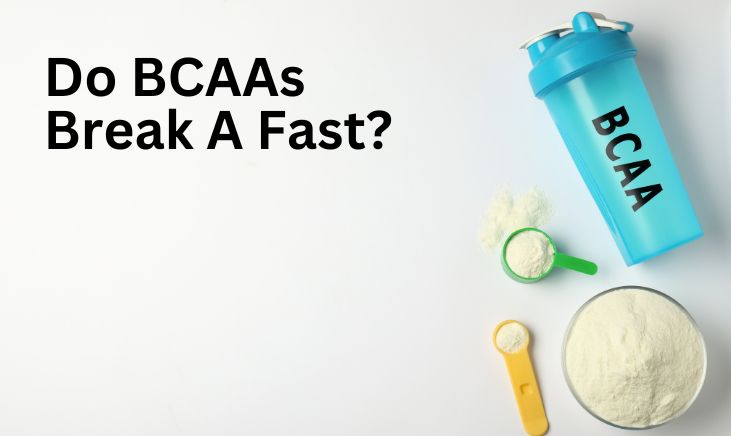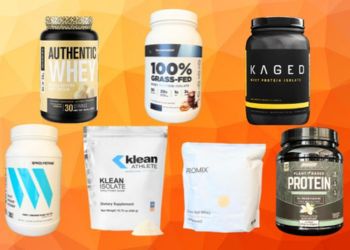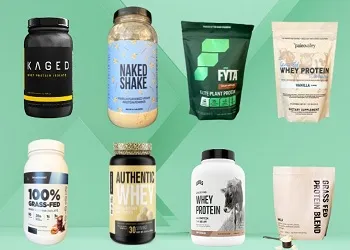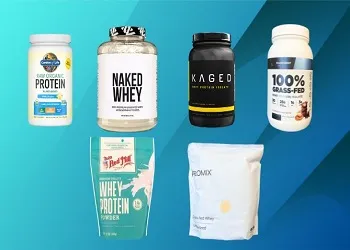Branched-chain amino acids, also known as the BCAAs, are a group of three amino acids—leucine, isoleucine, and valine—that play a significant role in muscle growth and repair.
But do BCAAs break a fast? The answer is yes. While some supplements may not break a fast, some amino acids can trigger an insulin response, and taking BCAAs during intermittent fasting will kick you out of a fasted state.
Quick Look
- BCAAs are composed of three essential amino acids: leucine, isoleucine, and valine.
- Increasing muscle growth, reducing intra-workout fatigue, and mitigating muscle soreness are the main benefits of BCAAs for athletes.
- BCAAs, specifically leucine, trigger insulin release from the pancreas and will break a fast.
- Non-caloric beverages (water, herbal tea, black coffee) are the safest options to consume during a fast to remain in a fasted state.
Table of Contents
What Are BCAAs?

Before we can talk about BCAAs, we need to understand what amino acids are.
Amino acids are the fundamental building blocks of all proteins and serve as nitrogenous backbones for several compounds, including hormones and neurotransmitters. In simple terms, amino acids are some of the most important building blocks of the human body.
Twenty amino acids combine to create thousands of different function proteins in the body. To be specific, there are roughly 20,000 unique protein-encoding genes that produce over 100,000 unique proteins in the body. These amino acids are classified into three groups:
- Essential amino acids (EAAs): The body cannot produce EAAs, and they must be obtained through diet or supplementation.
- Non-essential amino acids: These can be synthesized in the body using essential amino acids.
- Conditionally essential amino acids: The body cannot synthesize these in sufficient quantities during specific physiological periods of growth, such as pregnancy, adolescent development, or recovery from trauma.
Check out the table below for a breakdown of the amino acids.
| Essential | Non-essential | Conditionally essential |
| Phenylalanine Valine Tryptophan Threonine Isoleucine Methionine Histidine Leucine Lysine | Alanine Aspartic acid (aspartate) Asparagine Glutamic acid (glutamate) Selenocysteine | Arginine Cysteine Glutamine Glycine Proline Serine Tyrosine |
BCAAs are a group of three EAAs classified based on their configuration that have anabolic properties. They include:
- Leucine
- Isoleucine
- Valine
It’s said that BCAAs have a specific capacity to promote muscle growth, and research tends to support that theory. They’ve become a multi-million-dollar industry of nutritional supplements claiming to offer the biggest and best results for lifters looking for an edge—but the results you achieve with BCAAs may depend on when you take them.
EAAs vs. BCAAs
When we look at the list of essential amino acids, the three BCAAs are included. Leucine, isoleucine, and valine are all EAAs, but they’re categorized on their own based on their ability to stimulate muscle protein synthesis.
Simply put, all BCAAs are essential amino acids, but not all EAAs are BCAAs.
The BCAAs have a strong reputation for building and maintaining muscle mass and accelerating muscle recovery, but they don’t provide the full spectrum of amino acids required for overall health and well-being. Your body needs sufficient quantities of EAAs to carry out everyday functions, such as regulating digestion and supporting energy levels, mood, muscle growth and repair, and immunity.
BCAAs, however, are a subsection of EAAs that are no less essential for optimal function but are more geared explicitly to athletic performance.
Key takeaway: There are 20 amino acids in the body required to synthesize functional proteins. The branched-chain amino acids are three essential amino acids: leucine, isoleucine, and valine.
3 Benefits of Taking BCAAs
The BCAAs might be a top pick for bodybuilders looking to max out on muscle growth, but muscle isn’t where the benefits stop. Here are three reasons why BCAAs are one of the top fitness supplements.
- Support Muscle Growth

Supporting muscle growth is one of the top reasons for taking BCAA supplements. Because leucine, isoleucine, and valine have prominent roles in muscle protein synthesis (MPS), supplementing with BCAAs can enhance muscle growth by activating key enzymes involved in muscle growth pathways.
Leucine, specifically, has one of the biggest roles in stimulating muscle protein synthesis. How? It targets the rapamycin complex-1, a key signaling protein triggering the muscle-building cascade.
On top of triggering muscle growth directly, BCAAs also prevent muscle breakdown and support muscle fatigue, which can help you train harder for longer, facilitating more muscle damage and, subsequently, more muscle growth.
- Reduce Muscle Soreness

Building muscle is a heavy job, typically resulting in post-workout muscle soreness (or DOMS). BCAA supplementation can help mitigate the effects of a heavy lift by improving muscle recovery after exercise. Thanks to their ability to reduce protein breakdown during exercise and decrease creatine kinase levels, an indicator of muscle damage, BCAAs can get you back up and running faster.
The degree of muscle soreness usually varies with exercise type and duration, but BCAAs have been proven to be especially helpful for reducing delayed onset muscle soreness, which typically occurs between 24 and 72 hours after exercise.
- Reduce Intra-Workout Fatigue

If you struggle to get through your entire workout due to muscle fatigue, adding BCAAs to your water might help eliminate (or at least reduce) the problem. Branched-chain amino acids have been shown to enhance exercise performance by breaking down substances that contribute to exercise fatigue.
Research shows that BCAAs may attenuate the production of serotonin, which contributes to feelings of fatigue and loss of motivation during exercise. It does this by decreasing the uptake of free tryptophan in the brain and reducing brain 5-HT (serotonin) synthesis, thereby delaying central fatigue.
Key takeaway: BCAA supplements may enhance exercise performance by promoting muscle growth, enhancing muscle recovery, and reducing intra-workout fatigue. If you are looking for some extra workout benefits we have created a best BCAA supplement list.
How Does Intermittent Fasting Work?

For those new to intermittent fasting (IF), it’s a pretty simple way of improving several aspects of health. Like regular fasting, intermittent fasting means you abstain from food for a certain number of hours daily—you cycle between a fasting and eating window.
But there isn’t just one way to do intermittent fasting. Here are four of the most popular intermittent fasting protocols:
- Alternate day fasting: Fast every other day and eat normally on non-fasting days.
- 16/8 method: Fast for 16 hours of the day and eat normally for the remaining 8 hours.
- 5:2 diet: Eat normally five days a week and restrict food intake to 500-600 calories on the other two days.
- Eat, stop, eat: Complete a 24-hour fast once or twice per week.
Numerous health benefits have been linked to intermittent fasting, and for most people, it’s a sustainable and easy way to maximize health.
So, what’s the big deal with intermittent fasting? Here’s a quick overview of some of the health benefits of intermittent fasting:
- Stimulates weight loss
- Improves insulin sensitivity
- Reduces inflammation
- Improves heart health
- Reduces cancer risk
- Enhances brain health
- Increases longevity
Although not a complete list of benefits linked to regular fasting, it provides a good idea of why people forgo food for a specified number of hours per day.
Key takeaway: The 16/8 method and alternate-day fasting are two of the most popular forms of intermittent fasting, which have been shown to trigger weight loss, improve glycemic function, reduce inflammation, and boost brain health.
Do Amino Acids Break a Fast?
Taking branched-chain amino acids offers many benefits for athletic performance, but what about taking them while fasting?
If you’re exercising during a fast, you might think throwing a scoop of BCAA powder into your sports cup would offer additional benefits, but hang tight—amino acids might kick you out of a fasting state.
Before we can explain why BCAAs will stop a fast, it’s important to understand how different foods or beverages will do so.
One of the reasons intermittent fasting, or fasting in general, has such profound effects on metabolic health and disease prevention is that it keeps insulin levels low. High insulin and circulating glucose levels are significant drivers of disease, and refraining from food intake keeps insulin levels low. In doing so, a cellular process called autophagy can be turned on—studies show that short-term fasting induces dramatic upregulation in neuronal autophagy, offering significant neuroprotective effects.
However, one important thing to know is that insulin signaling regulates glucose concentration in the blood and inhibits autophagy. Autophagy and other cellular processes cannot happen when insulin levels are high.
But what spikes insulin? Virtually any food and beverage with a caloric content—and even some without.
Most individual amino acids cause an insulin response, but there are differences among amino acids and the degree to which they stimulate insulin secretion.
In the case of BCAAs, leucine itself, rather than one of its metabolites, is a potent stimulus that triggers insulin release when administered, and the mechanism by which leucine causes insulin release is different than that of other essential amino acids. It does so in two ways:
- Deamination to yield KIC (α-ketoisocaproate)
- Enhance glutaminolysis via allosterically activating glutamate dehydrogenase (GDH), a critical enzyme that controls the oxidation of glutamate
What we said might sound too scientific and might not make sense to you, but the point here is that leucine administration triggers insulin release, and increasing insulin will kick you out of a fasted state. If you want to take BCAAs, save them for your feeding window.
What Does Break a Fast?

So, if specific amino acids—including some of the BCAAs—trigger insulin release, what else breaks a fast?
The all-or-nothing approach to fasting doesn’t work for everything—it’s also not sustainable for some people—so consuming some calories may maintain a fasted state; this is called the “fasting-mimicking diet.” Although we’re not going to get into the nitty-gritty of what does and doesn’t break intermittent fasting, here are two supplements that could:
- Omega-3s: Any sort of omega-3 fatty acid—algae oil, fish oil, cod liver oil—that is composed of pure fat has the potential to kick you out of a fasted state, depending on how much you’re consuming. A couple of capsules might keep you in the safe zone, but more than one tablespoon (15g) might push you into murky water.
- Protein powder: Any protein, food or powder, should be avoided during fasting. Not only does it have a caloric tag, but similar to leucine and some other amino acids, protein powder will trigger an insulin response and break your fast. The same applies to any supplements containing collagen peptides.
- Artificial sweeteners: Sweeteners taste like sugar, and the body can’t always tell the difference. Research suggests that ingesting certain artificial sweeteners triggers insulin release from the pancreas, as they are mistaken for glucose, thanks to their sweet taste. When insulin is released, your fast is broken. Long story short, don’t drink artificially sweetened beverages during intermittent fasting.
Generally, any food or beverage with calories is a big no during a fast—and even some that don’t have calories. MCT oil might be the exception to the rule, as it doesn’t trigger insulin secretion. Some research suggests that with its unique metabolic properties, MCT oil may actually improve insulin sensitivity.
Pro tip: Stick to water, herbal teas, and black coffee during your fasting window to maximize benefits and avoid triggering insulin release.
Conclusion
Intermittent fasting is a popular option for people looking to improve their health and lifespan, but 100% fasting can be tricky. While BCAAs might offer many benefits, especially for people exercising in a fasted state, BCAAs during intermittent fasting will trigger the release of insulin and break a fasted state. As such, people trying to stay in a fasted state should avoid taking BCAAs while fasting.
FAQs
Can I take BCAAs on an empty stomach?
Yes. There’s no definitive answer whether BCAAs are more effective when taken on an empty stomach or with food. However, it’s suggested that BCAAs absorb faster and reach peak concentration more quickly than whey protein or other food sources because they aren’t bound to other amino acids, making them a good option for limiting muscle breakdown if you’re training on an empty stomach.
Will amino acids break my fast?
Whether BCAAs break intermittent fasting depends on the type of amino acid. Studies show that leucine and arginine both trigger insulin release, which will break a fast. That said, other amino acids may be taken during fasting without affecting insulin response.
Why should I take branched chain amino acids?
Branched-chain amino acids benefit athletic performance in several ways, including promoting muscle building, improving muscle recovery, and reducing intra-workout fatigue.
Should I take BCAAs every day?
Taking BCAA supplements is safe for healthy adults in doses ranging from 4 to 20 grams per day, with prolonged intake offering greater benefits than acute intake. To maximize the muscle-building benefits, you’ll want to aim for 2-3 grams of leucine around workout times.
Is BCAA a pre or post-workout supplement?
BCAAs can be taken at any time around training. They offer benefits for preserving lean muscle mass and mitigating fatigue during exercise, but they can also be consumed post-workout to support muscle repair and recovery.
References













